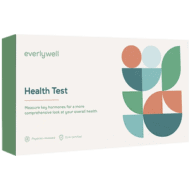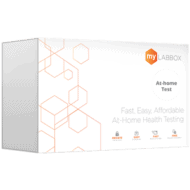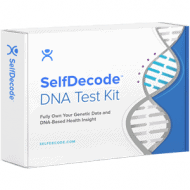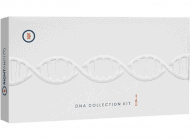What is a DNA test for diet and fitness?
A DNA test for diet and fitness is intended to provide you with nutrition and exercise insights and recommendations specifically designed to be most effective given your personal genetic profile.
Why should you buy a DNA test for diet and fitness?
Different people metabolize fat, carbohydrates, and protein differently depending on their genetic heritage. In this way, your DNA can have important implications regarding your physical condition, as well as the kind of diet and exercise regimens that will work best for you.
Many people who are struggling to accomplish their weight and fitness goals discover valuable insights from DNA testing that can help them achieve greater success. The information provided in these reports can help you better understand your body, and what it needs to perform at its best.
What can you learn from a diet and fitness DNA test?
A DNA-based diet test can provide direction on the types of food that you should seek out or avoid, based on your personal metabolism. Many offer customized weight loss strategies or meal plans, including recommendations for specific vitamins and nutrients. Some reports will even provide insight on food craving levels and your genetic ability to control weight.
Similarly, a fitness DNA test can give you helpful clues about what types of exercises will be most effective in helping you achieve your fitness goals – whether you want to build muscle or increase endurance. You’ll receive customized recommendations for workout length, frequency, and intensity in both cardiovascular and weight training categories.
How much does a DNA test cost?
In the United States, prices for diet and fitness DNA tests can range significantly – from around $50 to many hundreds of dollars.
Not all tests are the same. The more expensive ones usually offer more features, such as personalized information regarding food sensitivities, ongoing progress reports, or a database of customized recipes.
When shopping for a DNA test, be sure to compare features as well as prices. Choose the option that fits your goals at the greatest value. It is also important to read customer and expert reviews.
How do you read your DNA test results?
DNA testing companies generally post test results on their websites – which you can access with a personalized code. Some also offer a mobile app, and/or let you download your report as a PDF that you can print.
Your DNA report will explain what information the test has revealed, and the science that was used to reach these conclusions. They’re mostly written in accessible language that you don’t need a technical background to understand.
Some companies provide examples of reports on their websites. These will give you a sense of the information you can expect to receive. You can also request a sample report to help you decide between options.
Can a DNA test really pinpoint the best fitness routine for you?
A DNA test can identify the specific genes that affect your ability to build muscle mass, your endurance levels, your fat burning ability, and your metabolism.
Knowing your genetic predispositions in these areas can help you adjust your exercise regimen so you can best meet your goals.
What can a DNA test tell you about your diet?
Everyone metabolizes protein, fats, and carbohydrates differently. Some people have a harder time absorbing particular nutrients, or digesting certain types of food. Your genetic heritage can influence all of these factors, and can even affect things like caffeine consumption.
A DNA test can give you insight when it comes to making more informed food choices, so you can improve your health and maintain your optimal weight.
What are food sensitivities and intolerances?
Some people experience gastrointestinal problems or other negative symptoms after eating certain foods. These reactions, called food sensitivities, can occur hours or even days after the trigger food has been eaten.
A food intolerance is usually defined more narrowly, as an inability to digest a certain food, causing abdominal pain, gas, or diarrhea.
A DNA test can identify your likelihood to have a sensitivity or intolerance to a particular food. If you’ve been experiencing symptoms and struggling to identify their source, a DNA test might provide a clue.
What is an injury and recovery profile?
This describes your vulnerability to certain types of injuries and how quickly you are likely to heal. There’s a genetic component to this, which can be identified through DNA testing. This information can help you take steps to either avoid such injuries or facilitate your recovery.
What are sleep and stress reports?
Your ability to sleep soundly is most strongly affected by your personal sleep habits, but some people are genetically more likely to be restless sleepers than others. Likewise, your susceptibility to stress can have a genetic component.
Some DNA test reports tell you about your traits in these areas, helping you make informed choices about improving your sleep and reducing stress.
Can you trust the information you receive from a diet and fitness DNA test?
DNA tests look at certain genetic markers associated with particular traits, including those relevant to diet and fitness. A DNA test can reliably tell you if you’re more likely to have these traits than the general population.
However, an indication of likelihood is not definitive. Compare your test results to your own personal experience and decide whether it seems relevant. Many people have seen very good results from following the diet and fitness recommendations in their DNA reports.
Should you take this information to your doctor?
Some diets and exercise regimens can be dangerous for people with certain health conditions. So even though a DNA test may tell you to follow a particular diet or workout routine, it’s still wise to ask your doctor if it’s safe for you.
What other types of DNA test kits are available?
Your DNA can reveal a tremendous amount of information about you, from where your ancestors came from to whether you are predisposed to certain diseases. More and more DNA tests are becoming commercially available for individuals – and even pets! Beyond diet and fitness, the two most common categories of DNA tests are ancestry and health and wellness.
Ancestry
Ancestry tests can tell you what combination of ethnicity lie in your family’s past. You can also discover relatives around the world based on your shared DNA.
In addition, ancestry tests can tell you about genetic traits like eye color, height, and hair growth patterns. Some will even tell you whether any of your ancestors were Neanderthals!
Health and Wellness
A health test will tell you whether you’re genetically predisposed to have certain diseases such as cancer, Parkinson’s, or type 2 diabetes. It can also indicate whether you’re a carrier for an inherited disorder, like cystic fibrosis.
A wellness test can give you a lot of useful information about what nutritional supplements you may need, your ideal skin care, your genetic traits involving sleep and stress, and a lot more.















